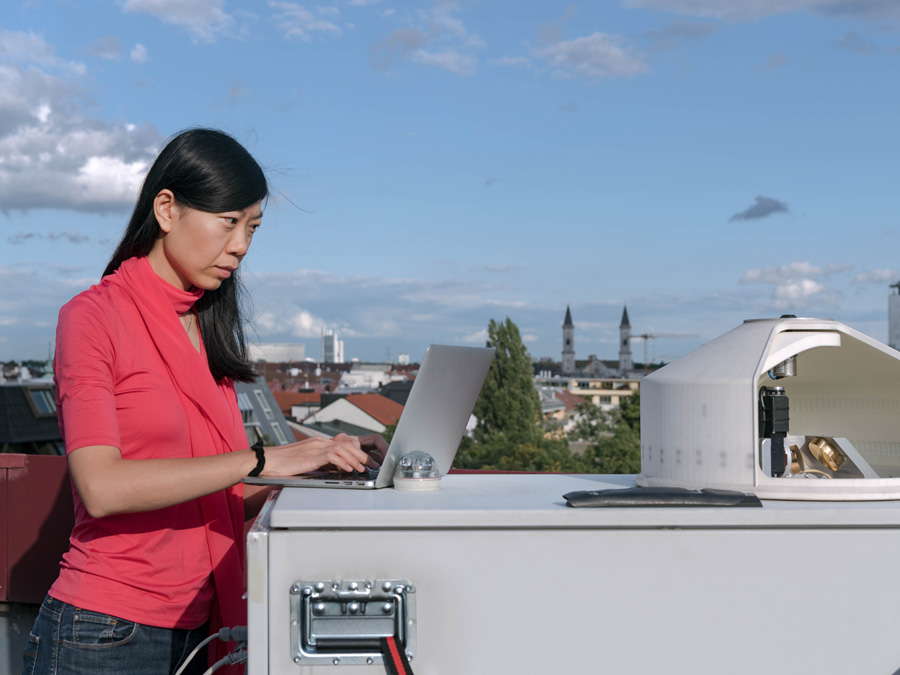Prof. Jia Chen on her greenhouse gas investigations during the Oktoberfest
“The start of the Oktoberfest means a rise in methane emissions”

Prof. Chen, you intend to measure the methane emissions on the festival site during the Oktoberfest. How did the project come about?
Last year, as part of an international study, we monitored the emission of carbon monoxide, carbon dioxide and methane in Munich over a longer period of time. We noticed a significant rise in methane emissions in the city coinciding with the beginning of the Oktoberfest, followed by a return to original levels after the conclusion of the Oktoberfest. This year we plan to investigate the situation once again and in greater detail.
Are the visitors to the Oktoberfest the reason for the higher levels?
No, certainly not. Only about 50% of the population emits methane and could contribute with several micrograms of methane per second, but even a record-breaking Oktoberfest attendance would never be enough to account for the values we've measured. The three most possible sources of the methane are the waste water from the catering operations and the toilets, the gas grills in the festival tents and booths, and the gas supply for grills and heating units.
Methane makes many people think about gas leaks. Is there any danger of an explosion at the Oktoberfest?
There's no danger of a gas explosion at all. We're talking about concentrations of a couple of methane molecules for every million air molecules. In order to be flammable, the methane concentration would have to be more than thousand times higher.
Then why is such a low concentration important?
Methane is a greenhouse gas which accelerates global warming, even 28 times more than CO2 over 100 years. And what's more, since 2006 emissions of methane have been increasing worldwide, without a reliable explanation of why this is happening. This makes it important to precisely understand where and why methane emissions take place.
How exactly do your measurements work?
We work with two optical sensors aimed at the sun. We use them to perform column measurements: this means we measure the amount of greenhouse gasses in the air column between the sensor and the sun.
Why do you need two sensors?
Well, put very simply: we position the first sensor in the direction of the wind in front of the festival grounds and the second behind the festival grounds. All the greenhouse gasses which are measured by the second sensor but not by the first must then have originated at the Oktoberfest. We've developed a computer model for high-performance computers that takes weather data such as wind speed and air pressure into account. The complex calculations in this model provide us with a large amount of information information on greenhouse gas emissions. For example, based on two measuring stations we can determine whether the strongest methane sources are located to the north, east, west or south of the festival grounds. Our objective is not to point an accusing finger at the Oktoberfest: over the course of the year, emissions from other known sources in the city are higher than the ones from the festival. But if we want to reduce emissions of greenhouse gases in Munich and Germany, it is important to detect and address as yet unknown sources as well.
Is the Oktoberfest a unique case or can we learn something of value to other countries as well?
Festivals are held throughout the year in Germany and the rest of the world. If we, for example, were to find out in the course of our investigations that we could cut the Oktoberfest's emissions by taking simple steps, let's say by making minor changes to the natural gas lines, it might be possible to apply the same steps in other places. It might also be possible to apply these measures outside of major events like the Oktoberfest. Taken together, small steps can also bring us a lot closer to achieving world climate goals.
More information:
Contact:
Prof. Dr.-Ing. Jia Chen
Assistant Professorship of Environmental Sensing and Modeling
Technical University of Munich
Tel. +49 (0)89 289 23350
jia.chen@tum.de